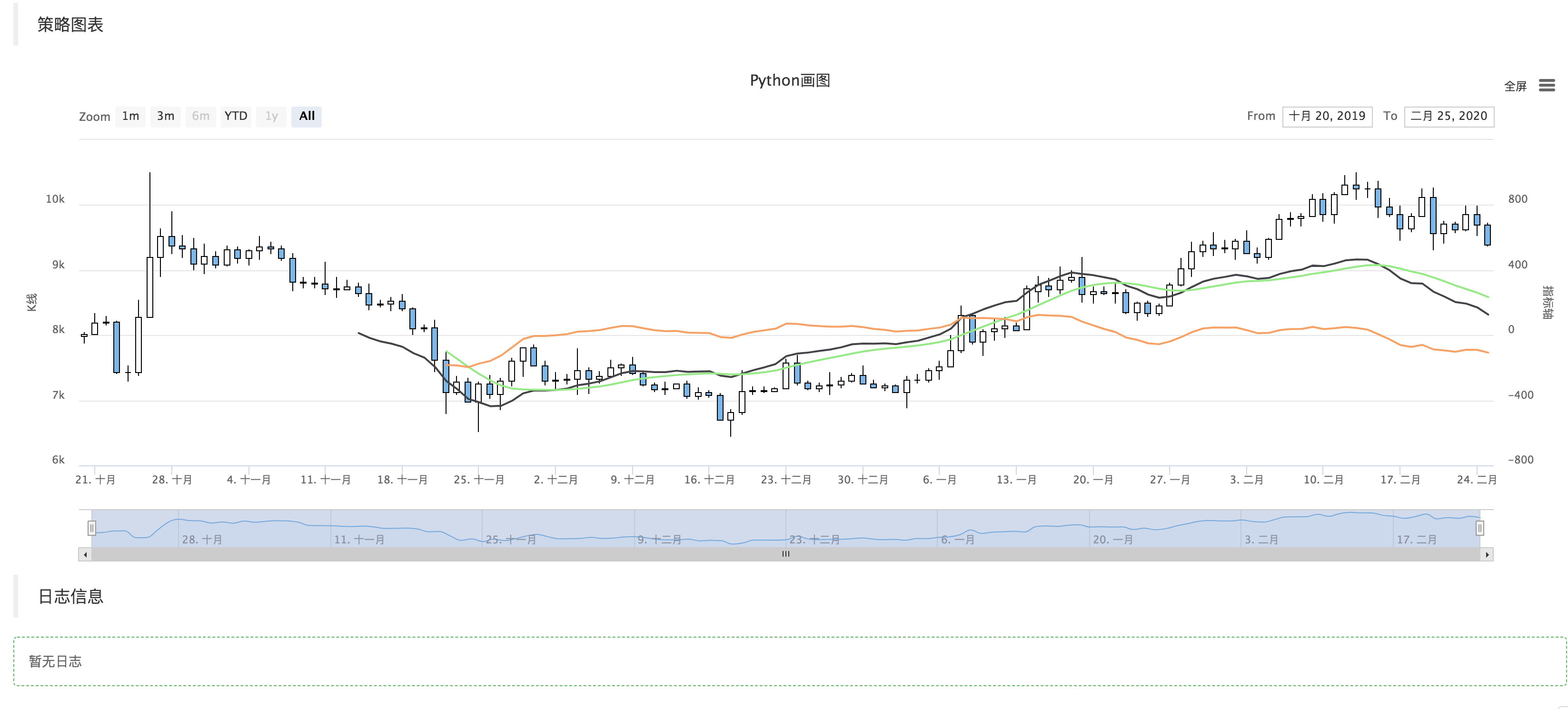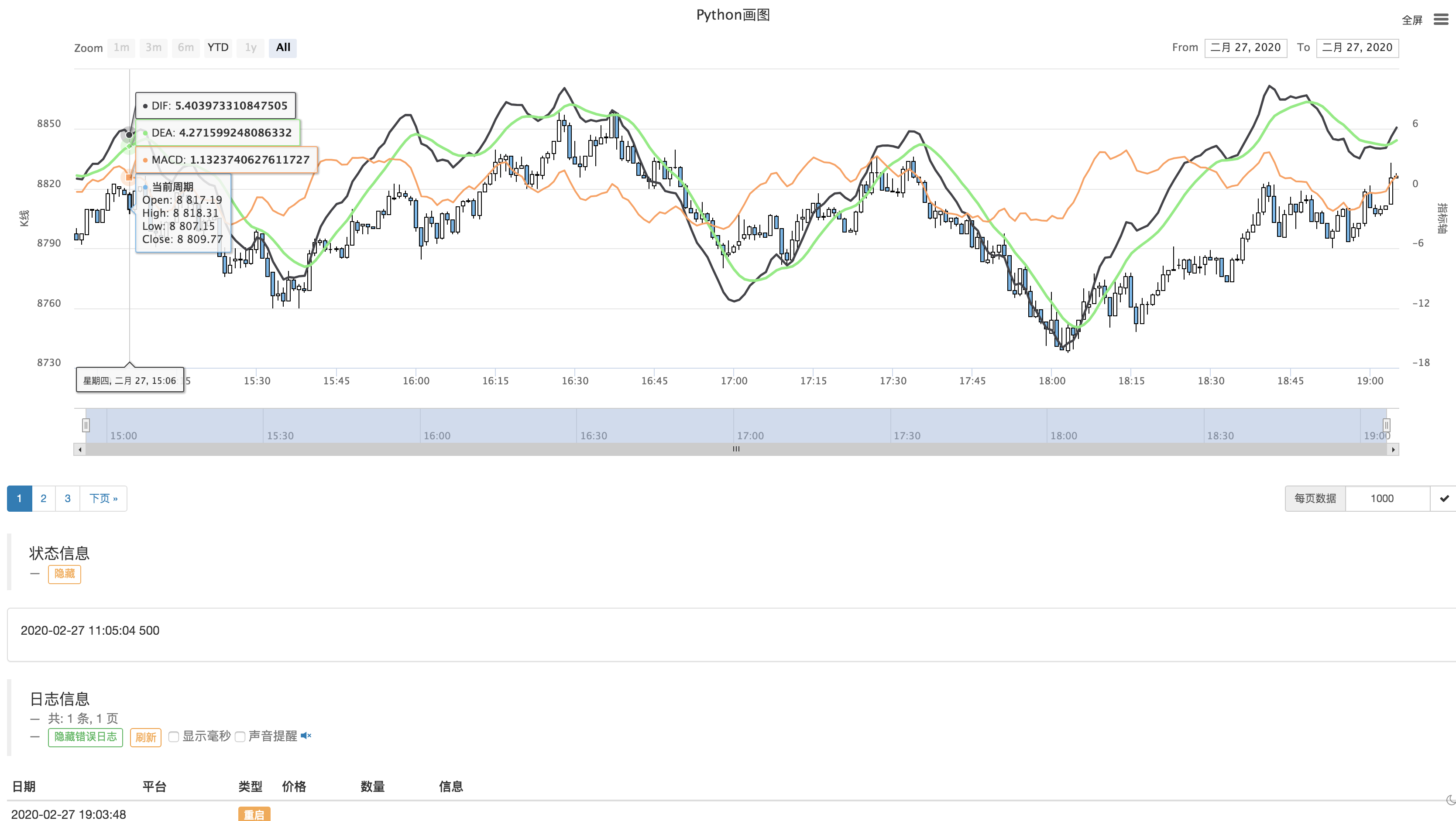Python version of the MACD graph example
Author: Inventors quantify - small dreams, Created: 2020-02-27 19:18:17, Updated: 2023-10-09 22:50:01
Python version of the MACD graph example
In fact, before doing this example code, the inventors quantified the trading platform strategy in Square:https://www.fmz.com/strategy/151972There are already examples of MACD pointer diagrams in JavaScript. However, the user needs to write a Python version of the example to be used as reference code when developing a design diagram.
The code is very simple:
'''backtest
start: 2020-01-28 00:00:00
end: 2020-02-26 00:00:00
period: 1d
exchanges: [{"eid":"OKEX","currency":"BTC_USDT"}]
'''
ChartCfg = {
'__isStock': True,
'title': {
'text': 'Python画图'
},
'yAxis': [{
'title': {'text': 'K线'},
'style': {'color': '#4572A7'},
'opposite': False
}, {
'title': {'text': '指标轴'},
'opposite': True
}],
'series': [{
'type': 'candlestick',
'name': '当前周期',
'id': 'primary',
'data': []
}, {
'type': 'line',
'id': 'dif',
'name': 'DIF',
"yAxis" : 1,
'data': []
}, {
'type': 'line',
'id': 'dea',
'name': 'DEA',
"yAxis" : 1,
'data': []
}, {
'type': 'line',
'id': 'macd',
'name': 'MACD',
"yAxis" : 1,
'data': []
}]
}
def main():
global ChartCfg
preTime = 0
chart = Chart(ChartCfg)
chart.reset()
while True:
while True:
r = _C(exchange.GetRecords)
if len(r) > 50:
break
# 计算指标
macd = TA.MACD(r)
LogStatus(_D(), len(r))
# 画图
for i in range(len(r)):
if r[i]["Time"] == preTime:
chart.add(0, [r[i]["Time"], r[i]["Open"], r[i]["High"], r[i]["Low"], r[i]["Close"]], -1)
chart.add(1, [r[i]["Time"], macd[0][i]], -1)
chart.add(2, [r[i]["Time"], macd[1][i]], -1)
chart.add(3, [r[i]["Time"], macd[2][i]], -1)
elif r[i]["Time"] > preTime:
chart.add(0, [r[i]["Time"], r[i]["Open"], r[i]["High"], r[i]["Low"], r[i]["Close"]])
chart.add(1, [r[i]["Time"], macd[0][i]])
chart.add(2, [r[i]["Time"], macd[1][i]])
chart.add(3, [r[i]["Time"], macd[2][i]])
preTime = r[i]["Time"]
Sleep(500)
ChartCfg Chart configuration dictionary
This oneChartCfgA dictionary variable stores chart configuration information, such as:
How many lines are there in this graph? (three indicator lines, DIF, DEA, MACD)
Is there a K-line in this graph? (K-type: This type is set to K-line data)
The MACD values are relatively small, and if the trading pair is BTC_USDT, the indicator will be compressed together when drawing the chart, so the chart is also configured as two Y-axes.
Loading data
In this example strategy, the main function starts initializing the chart, calls the Chart function, configures the chart to ChartCfg as a parameter input, generates a chart object chart. Then goes into a loop, continuously obtaining K-line data, determining that the number of K-line data BAR is greater than 50 to calculate the MACD indicator (BAR is too small to calculate the valid indicator); then the K-line data and indicator data can be written to the chart. Write a method to a chart using the chart object add function. When writing, if the last parameter of the add function is specified -1, the value of the current data point is updated. If not passed -1, a new data point is added. When a new K-line BAR is generated, a new data point is added, and when a K-line BAR is not generated, the last BAR and the corresponding indicator are updated.
It can be directly measured.

It can also run on a hard disk:
The following is the address of the strategic example:https://www.fmz.com/strategy/187379
If you have any questions, thank you for leaving a message.
- Quantitative Practice of DEX Exchanges (2) -- Hyperliquid User Guide
- DEX exchange quantitative practices ((2) -- Hyperliquid user guide
- Quantitative Practice of DEX Exchanges (1) -- dYdX v4 User Guide
- Introduction to Lead-Lag Arbitrage in Cryptocurrency (3)
- DEX exchange quantitative practice ((1) -- dYdX v4 user guide
- Introduction to the Lead-Lag suite in digital currency (3)
- Introduction to Lead-Lag Arbitrage in Cryptocurrency (2)
- Introduction to the Lead-Lag suite in the digital currency (2)
- Discussion on External Signal Reception of FMZ Platform: A Complete Solution for Receiving Signals with Built-in Http Service in Strategy
- Discussing FMZ platform external signal reception: a complete set of strategies for the reception of signals from built-in HTTP services
- Introduction to Lead-Lag Arbitrage in Cryptocurrency (1)
- JavaScript version of the SuperTrend policy
- [Millennium War] Currency exchange multi-currency hedging strategies Recent recaps and results of the minute-level K-line review ((Part 4)
- Hands-on teaches you how to implement a data collector
- [Millennium War] Bitcoin futures do nothing and do more and more and more and more and more and more and more and more and more and more and more and more and more and more and more and more and more and more and more and more and more]
- [Millennium War] Bitcoin futures do nothing and do more and more and more and more and more and more and more and more and more and more and more and more.
- [Millennium War] Research on multi-currency hedging strategies in the field of currency exchange (part 1)
- 98 undergraduate coins and the way to quantify
- Python iceberg delegation policy
- Dynamic balancing strategies based on digital currency
- Use a trading terminal plug-in to facilitate manual transactions
- The strategy of cross-currency arbitrage based on the Brin Belt
- Timing start or stop widgets for quantified trading robots using Python
- Corrupt Sisters Speak at the First Session of the General Assembly
- Quantitative fractional rate trading strategy
- The Python spreadsheet platform balancing strategy
- The old farmer's journey to the pit
- The story of a post-95 coin collector
- Hands-on teaches you how to convert a Python single-variety policy into a multi-variety policy.
- My automation loss and FMZ shore trip
- FMZ heartbeat pathway - leap forward strategy included